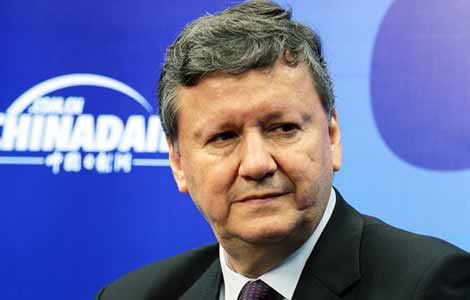Amber alert across Asia, but not red
Updated: 2013-09-23 02:07
By KARL WILSON in Sydney (China Daily)
|
|||||||||||
But she adds that stories featuring elevated foreign positioning in local currency government bond markets — currently more than 30 percent in Malaysia and Indonesia — and credit booms accompanied by asset inflation, do not usually have a happy ending.
Ling says that she would characterize the current bout of risk-off for emerging markets and Asian economies as "more like an unwinding after very strong QE-fuelled liquidity inflows into the region".
"With the Fed contemplating QE tapering and the US dollar to gain more traction amid rising US Treasury bond yields, the carry proposition is very different," she says.
"Risk premiums likely have to rise for emerging market countries, given that China is serious about its reform agenda and deliberately shifting to a more sustainable medium-term growth trajectory, which will have serious implications for regional growth, especially from the intra-regional trade angle.
"But this is not to downplay the risks within Asia, namely that the credit booms and rapid asset price inflation may mean leaner days ahead for the economy and banking systems when correction hits."
But Ling reiterates that the Asian banking systems are more resilient and robust compared with 1997, and that macroprudential measures have featured prominently in recent years.
"So while non-performing loans may rise somewhat with any significant price correction, a systemic domestic banking crisis looks less likely to arise from domestic factors."
Ling adds that the deteriorating current account balances for selected countries, such as India, Indonesia, and possibly even Malaysia, remain bugbears for now.
One bright spot in the region is the Philippines, which recently saw its growth expand at a higher 7.5 percent in the second quarter — the fourth consecutive quarter when growth has been above 7 percent.
"A current account surplus, a high level of foreign exchange reserves and low foreign currency debt mean the Philippines is in a good position to cope with the turnaround in investor sentiment," Capital Economics, a macroeconomic research institute, said in a recent note.
Looking at the wider region, the head of Asian economic research for HSBC, Frederic Neumann, believes that even with the cracks, the current jitters are unlikely to evolve into a classic financial crisis.
"It's easy to draw parallels to 1997. But that would be misplaced," Neumann told The Sydney Morning Herald recently.
"Climbing US rates in themselves are not sufficient to knock out the region's financial system and spark a crisis that many apparently fear. At the same time, high leverage renders Asian growth a lot more sensitive to global financial conditions than in the past."
He also referred to how financial conditions have "undoubtedly tightened".
"The result is that growth will limp along, unlikely to accelerate sharply any time soon. In most markets, debt levels are higher than in 1997, or at any time in the previous two decades.
"Higher funding costs, even if not prohibitive, are bound to weigh on growth. And there is little central banks can do to offset this — nor should they, for their primary objective must be to curb even greater financial excesses rather than to boost growth artificially."
Related Stories
Asia-first approach in Australia's interest 2013-09-16 08:23
Survey shows increased optimism on China's economy 2013-09-18 14:15
HK economy's hidden peril 2013-09-11 06:52
G20 leaders to seek cure for ailing world economy 2013-09-04 13:19
Today's Top News
China's stabilizing influence
China's FM meets UN chief on Syria, development
Amber alert across Asia, but not red
Mission to moon will boost research, awareness
China-Germany relations stable
Verdict for Bo Xilai: Life in prison
Russian embassy to Syria shelled
Gunmen holding hostages in Nairobi
Hot Topics
Lunar probe , China growth forecasts, Emission rules get tougher, China seen through 'colored lens', International board,
Editor's Picks

|

|

|

|

|

|





